- Home
- Francis Spufford
Light Perpetual Page 2
Light Perpetual Read online
Page 2
‘Deep breaths, everyone,’ she says. ‘Open up those lungs. Use those chests. Bring the music up from your toes. Mouths open all the way. Heads high and sing out. Steven Jenkins, wipe your nose. With your handkerchief! And one – two – three – four—’ She plays the opening bars with heavy hands, and no excitement at all, but it doesn’t matter. There are the quick marching ripples of sound from the piano that come before the singing. They are almost silly somehow, like the National Anthem playing at the Bexford Odeon on Saturday morning before the main picture, wearily grand but no match for the roar of the kids in the stalls. Yet Jo can still hear the idea of the ripples coming firm and clear through the plinking of the old upright, saying: here is the river, here is the river, and making spreading rings of green and bronze in her head. Sometimes it doesn’t matter that things are silly. Then the music dances on the spot for a moment to tell them to get ready, and they all breathe in, Alec with a comical suction noise like a lift going up, and Class 5 opens its mouths all the way, and sings:
From the Cotswolds, from the Chilterns, from your fountains and your springs
Flow down, O London river, to the seagull’s silver wings:
Isis or Ock or Thame,
Forget your olden name,
And the lilies and the willows and the weirs from which you came.
Here are some of the things Jo doesn’t understand about the song: what the Cotswolds and the Chilterns are, what the words ‘Isis’ and ‘Ock’ and ‘Thame’ have to do with anything, what a weir is. But here are some of the things Jo does understand about the song. She knows that it is happening in a world where all the colours are brighter than ordinary, where seagulls are silver instead of the dingy white of the ones that come angling and tilting out of the river fog, over from the Royal Albert Dock or the Greenland in Bermondsey, appearing silent and marvellous over the house-ends of Bexford, and probably after your sandwiches. She knows that the sounds of the words match, and fit together like jigsaw pieces, even if she doesn’t know what they mean. Ock or Thame, olden name, da-da DA-da, da-da DA-da, da-da DA da-da-da came. She knows that in its posh inscrutable Technicolor way, it is saying that the river came from somewhere pretty in the country before it turned into the dirty brown flood that washes under the city bridges, and echoes from shore to shore with tugboat hooters, loud enough to shake the brickwork, or the window of a bus, if you’re going over the bridge just then. The glass buzzes under your fingertips when the hooters go. It makes your fingers go all numb and soapy. The Thames is an ugly big river, ugly and loud, not pretty, and the song is saying that being big and loud and ugly makes London exciting, and that being exciting is better than being pretty.
And most of all, she knows how you are supposed to sing it. It pounds along to begin with. The first line stomps like a march, da-da dee dee, dee dee DEE dee, only at the end, on ‘springs’, it suddenly mounts up to a higher note than you were expecting, to make a kind of platform you jump off from in the second line. ‘Flow down,’ it says, and it does flow down, or even fly down, like the seagull; and then like the seagull, when it has done its deepest dip, it banks up again, hovering in the middle of the air and in fact in the exact middle of the five black ruler marks the music lives on, at ‘wings’. And then ‘Isis or Ock or Thame’ and ‘Forget your olden name’ wind it up again. Step by step it climbs till it positively soars on ‘name’, and you think that the last line is going to let you open your throat as wide as a gramophone horn and fly, fly, fly to the end. But it doesn’t, it disappoints you, it disappoints you on purpose, dropping down to a dull and tidy-sounding end at ‘came’, only to give it all back even better, when you sing the last line unexpectedly over again. And the second time round, the ‘LIL-ies’ and the ‘WILL-ows’ are notes so high that they are trying to get free from the top of the ruler marks altogether, they are climbing out like men poking their heads out of attic windows, they are almost as high as Jo can manage to sing, and then the verse flies down to its true end with notes so long at ‘weeiiirrrs’ and at ‘caaaame’ that each of them fills a whole bar on its own, and uses up all your breath. Even Vern can tell you’re supposed to soar joyfully. Jo can hear him trying to winch himself squeakily aloft, and his voice almost vanishes in a sort of hoarse whistling noise. But it doesn’t spoil her pleasure in her own sure, ringing progress, nothing held back, along that last line. The high notes succeed each other in her mind’s eye like rays of scarlet and gold.
They are taking their new breath for the second verse – Alec is singing properly now and has forgotten to be funny – when Miss Turnbull’s hands falter to a stop on the piano. The Hall door has opened behind Class 5.
‘Was there something, Mr Hardy?’ she asks.
In comes the headmaster, bald and inky-black-moustached, prowling. Instantly Class 5 stiffens, because Mr H is a figure of terror. His office is where The Cane is kept, and by now a fair few of Class 5 have been sent to visit it and him: not Jo, but the fear spreads. He has a pouncing way of asking questions, and he does not make it easy to tell what answer will please him.
‘No, no,’ he says. ‘Don’t mind me. I won’t interrupt.’ But then he goes on, immediately, ‘Chil’erns. Chil’erns. That’s what I heard coming through the door. There’s a T in that word, children. Let me hear you all say it properly, please.’
‘Chilterns,’ Class 5 choruses, raggedly.
‘Louder, please.’
‘Chilterns!’
‘There,’ says Mr Hardy, but not as if he is satisfied. ‘Pronunciation is important, wouldn’t you agree, Miss Turnbull?’
‘Of course, Headmaster,’ she says flatly. And it’s true that Miss Turnbull frequently corrects dropped consonants and missing aitches, frequently sighs over the F that Class 5 puts in ‘south’ and the V in their ‘this’. But when she does it, it doesn’t have this cat-and-mouse quality. There is a tension between the two adults that Jo doesn’t understand. Mr Hardy, Jo notices, is quite a lot shorter than Miss Turnbull. He is standing next to the piano now, rocking on the balls of his feet while he surveys the class discontentedly, and thrusting out his waistcoated stomach. A watch-chain gleams there.
‘Carry on, then, Miss Turnbull,’ he says, not going away. Miss Turnbull plays the rippling chords of the opening again, and much more reluctantly, much more guardedly than before, Class 5 sings the next verse.
The stately towers and turrets are the children of a day:
You see them lift and vanish by your immemorial way:
The Saxon and the Dane,
They dared your deeps in vain –
The Romans and the Norman – they are past, but you remain.
This time around, the long notes at the end fade nervously away long before they should.
‘Hmph,’ says Mr Hardy, prodding at them all with his gaze. ‘Would you say that Class Five are making good progress, Miss Turnbull?’
She takes her hands off the keyboard and folds them in her lap.
‘Yes,’ she says unexpectedly. ‘They sing with feeling, and one or two of them have real promise.’
This is more praise than Jo has ever heard her utter, and she is surprised to hear it. She has always thought of Miss Turnbull, in Singing, as a kind of mechanism for operating the piano, completely unconnected to what she herself feels about the music. Class 5 stirs, tentatively trying out the feeling of being on Miss Turnbull’s side.
‘I’m pleased to hear it,’ grunts Mr Hardy, sounding anything but. He brightens. ‘But do they understand what they’re singing, eh? Boy in the front row there.’ His finger is pointing at Vernon. ‘“You see them lift and vanish by your immemorial way.” You’ve just sung it. What does it mean?’
‘Dunno, sir,’ says Vern.
‘All right, we’ll make it easier. You, girl; girl with the plaits. Who is “you” in the song, eh?’
Jo feels her mind going blank, all thoughts in it scurrying for cover like mice when you open the kitchen door. There is no way of connecting her mouth with the plea
sure in the song that was soaking her through five minutes earlier, no chance of a path between words and all that flying, flowing shape.
‘Well?’
Mr Hardy is looking at her. So is Miss Turnbull, making her chewing face.
‘It’s red, sir,’ she tries, trembling. ‘In your head. When you sing it.’
‘What?’ says Mr Hardy. ‘What? It sounds red? The girl’s an idiot.’
Vernon snickers, then stops abruptly. Alec has kicked him in the back of the knee. Jo can feel him swell next to her, a balloon full of trouble for somebody later, pumping up.
‘One doesn’t expect much round here,’ says Mr Hardy to Miss Turnbull, happily. ‘I know that. But still, this is disheartening, is it not?’
Miss Turnbull sighs.
‘Mister ’Ardy?’ says Alec suddenly.
‘What is it, boy?’ says the Head impatiently. He has much more to say. He has barely got started.
‘Could you hexplain it to us, sir please sir? That would be hever so kind. It would be hexcellent. It would make us really ’appy, sir please sir.’
Mr Hardy frowns, unsure if the child is in earnest. Jo doesn’t know what Alec is up to, except that it’s dangerous. But that is not what his normal voice is like. He is the one in Class 5 who gets told off least by Miss Turnbull for his vowels and his consonants. He can also spell everything, perfectly. His dad is in the print. Their house is full of books, shelves and shelves of them.
‘Very well,’ says the Head. ‘“You” in this verse is the river Thames itself—’
‘Never!’ says Alec, as if awestruck.
‘—along whose banks the various— Boy, are you being insolent?’
Class 5 have begun to giggle.
‘Me, sir? No, sir,’ says Alec. ‘I wouldn’t fink of such a fing.’
‘I think you are,’ says Mr Hardy.
‘Oh no, sir,’ says Alec. ‘I’m just so grateful, sir, to hunderstand the song, sir, what we’ve bin singing all this time, sir. It’s like a light bulb’s gone on in me ’ead, honest.’
More, louder giggles, and even Miss Turnbull, behind Mr Hardy’s back, has got her eyebrows raised and her lips clamped together, as if she is keeping something from coming out.
‘Right, that’s quite enough,’ says Mr Hardy, who has gone red. (But not the bright joyful colour Jo saw in her mind’s eye. A duller, nastier shade.) ‘Out! I’ll deal with you in my office, boy.’
And he reaches in with one of his sudden pounces, and grabs Alec by one of his ears, and marches out of the Hall with him, deliberately pulling too high so that Alec has to move at a kind of painful sidle-on-tiptoes, already crying out by the time his dangling boots have been hauled though the double doors. Class 5 have stopped laughing, and are gazing after them.
Miss Turnbull clears her throat, claps her hands.
‘All right, Class Five,’ she says, and her voice sounds less tired, ‘face the front. Shoulders back. Let’s sing verse three. One – two – three – four—’
Ben
‘Is this your first time, then, son?’ asks the man next to Ben’s dad. ‘Pick him up on your shoulders, mate, I don’t mind, give him a bit of a view.’
Ben’s used to people thinking he’s younger than he is, because he’s little. But it’s been a long time, years and years, since he was small enough to be carried, so it takes him by surprise when Dad grunts agreement, bends down, and hoists him high. All of a sudden, instead of struggling to see in a dark crush of coats and jackets, he’s up in the air. The back of Dad’s cap presses into his belly, and all around, he’s looking down on thousands of other men’s heads in their caps and their hats and their mufflers. It’s a sloping sea of shout, of fingers up and stabbing the air, of fags in the corners of mouths.
They’re up at the back of the south stand in the Den. It’s just a concrete slope going up in steps. Up here at the top it’s high enough to see the railway lines that hem the ground on three sides. Trains go by, over and over. Rattling green passenger carriages, faces like white peas in the windows. Wagons going from the docks or to the docks, dragged in clanking lines by engines that bark out smoke in hard gusts, like big dogs. The cindery clouds join the haze on the far side that’s always there, over towards the river. The cranes at the docks always stand in air thick as soup. But it’s just stopped raining and the wet has damped the haze down. The grass on the pitch has been washed back to a streaky green. The roofs opposite glimmer where the rainwater reflects the sky, and a wet gleam fingers a path along the top of the SUNLIGHT SOAP sign. The day is brightening. With all this noisy air open round him, Ben follows the brightness up, and up. He sees the London smoke is only a footstool. Above, the rain as it leaves mounts in a curving wall, immense, slate grey, slate purple. An anvil, pulling back. At the very very top, it cauliflowers. It goes to bumps and lumps and smoothed-out tiny battlements too complicated for your eyes, but all crisp and clear. A sky country far away, getting lighter. A rim there almost as burning white as summer clouds. This is wet autumn, though.
‘Mark him, mark him!’ the man next to Dad is bellowing cheerfully. ‘Come on, you Lions! Come on, you dozy cunts! Are you blind?’
In the green rectangle, the bright-blue Millwall players drain to the right. A sudden flood of Crystal Palace dark-red-and-blue has broken in. Bright blue recoils, gathers, closes in to grip the tip of the attack. At the tip, a tangle, a trip, a thud, a tumble. Two men roll over in a heap. Groans from the stand on the other side, but the ball rolls out, rolls loose. It looks tiny, such a tiny dot to make everyone move around it. Somebody kicks it left. All together the dark-red-and-blue are moving, the bright blues are moving, everyone is running back to the left again, colours pooling and separating as they go. Wheeling round each other. Drawing lines that change every second.
‘Pass it!’ yells the man, and all the other men nearby have their mouths open too. Opening and closing. Shouting different things.
‘Come on, you Lions!’ cries Ben experimentally.
‘Come on, you Lions!’ shouts Dad, and squeezes Ben’s ankles.
‘Move yer arse, Jimmy!’ shouts the man. ‘Jimmy Constantine, move yer arse!’
‘Which one’s Jimmy Constantine?’ asks Ben.
‘Number eight,’ says Dad.
‘The one with the fucking ball, son,’ says the man.
Dad turns his head.
‘Sorry,’ says the man, and shrugs.
‘All right,’ says Dad. ‘But son? We don’t talk like this at home.’
‘Yes, Dad,’ Ben starts to say, but it gets drowned. An enormous deep disappointed Oooooo comes up out of every throat on the home stand. Like they’ve all, together, turned into one big animal, angry or sad. Angry about being sad. Back goes the ball, wallop, way up high, deep into the Millwall half.
‘Should have passed it,’ says the man to himself, shaking his head. ‘Should have passed it. Useless bastard. Come on, you Lions!’
The ball goes to the right, to the left, to the right, to the left. Dark red washes into bright blue, bright blue surges into dark red. Waves on a beach. Ben went to Broadstairs with Auntie Joan’s family in the summer, and they sat him by the ragged line the seaweed made at the top of the sand, wrapped up so he didn’t get cold, and he watched the same rushing, never arriving, never getting tired. When the ball’s on the right, Dad and the man and all the other men gasp and cry out and suck their breaths in. On the left they roar, they push out big sounds on a note rising up, and up, and up, till Oooooo! the wave breaks, and it all runs back the other way. Ben joins in quietly. When he does, he feels the game working his own chest like a squeezebox. You don’t have to decide, it just happens. In, out. Oooooo! Come on, you Lions!
Up in the cauliflower kingdom in the sky, the top of the cloud is burning white and gold now. The sun is coming through. Shadows swing around. There’s a glare in the north-west that makes it hard to look that way.
‘Up the wing!’ groans the man.
Dark red pushes over to the
right again, but this time, when bright blue takes the ball back, someone kicks it long and high to the Crystal Palace end. The dot soars up. It seems to leave the whole shouting, roaring ground behind. It rises up towards where the cauliflower country is lost in glare. It spins slowly across the hazy metal thicket of the cranes. Like it has all the time in the world before it has to come down again. Like it might not come down again, this time. Like the sky might be going to keep it, and the Millwall players and the Crystal Palace players will have to say to the sky, ‘Can we have our ball back?’ Then the sun, breaking through, catches it, and it flares into a point of molten gold, intensely bright. Ben’s mind goes still, transfixed. Elsewhere the ball falls, is neatly snared on the run by a bright-blue attacker, is jinked left and right past a Crystal Palace defender, is passed hard and exact over to bright-blue number 8, just arrived at the perfect spot where he can spin and send it at an acute angle that looks almost impossible straight past the keeper and into the corner of the net. Oh-oh-oh-OOHHH! cry all the thousand men around Ben, their voices climbing up to ecstasy on steps of anxiety. But Ben’s mind’s eye is still full of the burning mote of gold, motionless in the air. It shone as if a hole had been pierced through the world. He hasn’t noticed the goal.

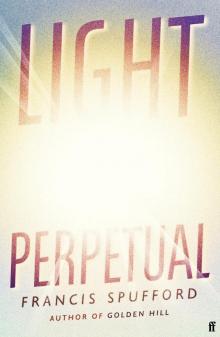 Light Perpetual
Light Perpetual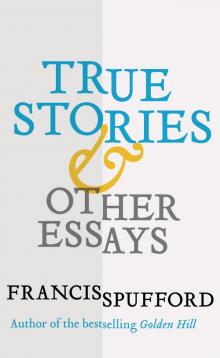 True Stories
True Stories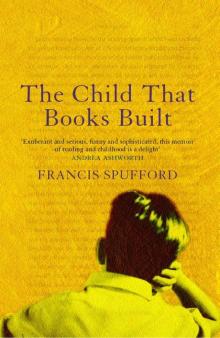 The Child that Books Built
The Child that Books Built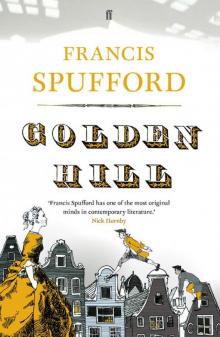 Golden Hill
Golden Hill Unapologetic
Unapologetic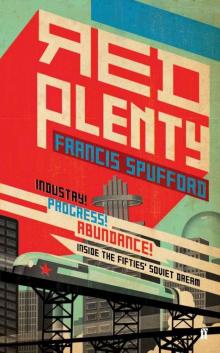 Red Plenty
Red Plenty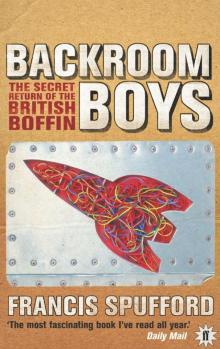 Backroom Boys
Backroom Boys